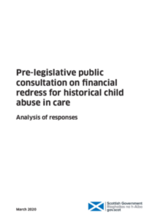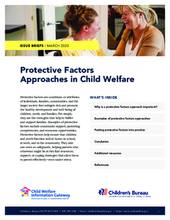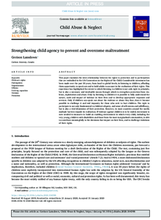Displaying 191 - 200 of 1087
The purpose of the present study was to examine how maltreatment chronicity and coping style were associated with internalizing, externalizing, and psychiatric hospitalizations, and whether coping style moderated the relation between maltreatment chronicity and mental health in a sample of foster adolescents.
This article explores progress and challenges in building statistical evidence on violence against children.
The purpose of this study was to conduct a systematic review and meta-analysis on the effectiveness of parenting interventions in preventing violence against children.
This qualitative study explores the experiences of unaccompanied children with regard to violence in reception facilities in the Netherlands from the perspective of the children.
The purpose of this study was to examine the lived experiences of posttraumatic growth (PTG) in adult survivors of institutional childhood abuse in Ireland.
This report presents findings from an independent analysis of the responses to a public consultation issued by the Scottish Government in September 2019, which invited views on its specific proposals for the establishment of a statutory financial redress scheme for victims / survivors of abuse in care.
This issue brief provides an overview of U.S. national protective factors approaches to prevent child abuse and neglect.
The third Netherlands’ Prevalence study of Maltreatment of children and youth (NPM-2017) provides an update of the current prevalence rates of child maltreatment and of changes in its prevalence over the last 12 years. In addition, risk factors for child maltreatment and its co-occurrence with domestic violence were investigated.
This paper examines the inter-relationship between the rights to protection and to participation that are embodied in the UN Convention on the Rights of the Child.
In this study, autobiographical memory tests, working memory, and a depressive symptom assessment were administered to 48 adolescents in care with a history of maltreatment (22 abused and 26 neglected) without mental disorder, who had been removed from their family and were living in residential child care, and to 61 adolescents nonmaltreated who had never been placed in care.



